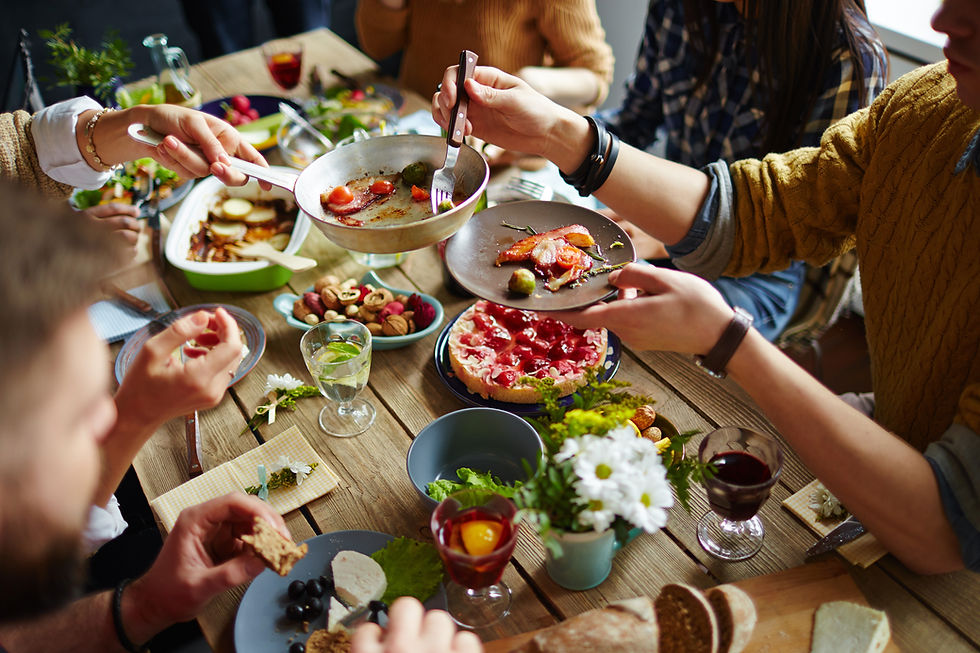What A Week Long Fast Taught Me
- Deborah Holmén

- Sep 2, 2018
- 6 min read

I never thought I would purposefully do a 7-day fast to get my body back on track. My only exposure to fasting growing up was from a religious stance of "no meat" on Fridays during Lent. Of course, that meant enjoying fish and chips at a local pub, so it really wasn't that bad. What I used to think fasting was for some extreme desire to connect with the Divine, or necessary for a medical procedure.
Whatever beliefs you may have about fasting, doing a 7 day fast convinced me that there is more to this practice than what we've been told. It can honestly be life-changing on so many levels.
I decided to try a week long fast after reading Dr. Jason Fung's book, The Complete Guide to Fasting. It seemed to be the only way I could get my insulin resistance back on track. I had gone Keto for a year, which helped me fix my adrenal fatigue and regain my health and vitality. However, I was still unable to budge the last 12 pounds I wanted to lose.
It got to the point I was barely eating anything. Rich and I would be at lunch, and he would comment, "Honey, you need to eat a little more than that. You're barely eating!"
I thought less on the plate would keep up my metabolism, and fewer calories meant less to burn. However, I had the whole concept wrong.

I was basing my entire knowledge of eating on the American Dietary Guidelines which was to eat small meals throughout the day. I already changed my belief system about fats being bad for you. Keto taught me that fat is an excellent fuel source for our brain and body.
Now I had to shed another contrary belief; eating many meals a day is good for my metabolism. What eating many times actually did to me was cause my insulin to stop working correctly.
Each time I put food in my mouth, insulin was injected into my system telling my cells to only take energy from the food I ate and not take energy from my own fat. My cells closed their walls and refused to release fat as its energy. So, it became a nasty cycle.
The instant I felt hungry, I'd eat, especially if I felt a little hypoglycemic. It wasn't until I read Dr. Fung's book that it clicked; stop eating, and you can't fire off any insulin. With no insulin to boss my cells around, my body would finally turn to my excess weight as fuel. I was already eating a Keto lifestyle, so my body was already used to burning fat as its fuel source.
Now, I just needed to shut off my excess insulin. So I decided to stop eating for 7 days to get my body sensitive to the hormone insulin again.
What I Learned
1.) Eating was a habit. I was stunned how much eating was out of habit and not of need. By 10 am, and 2 pm, I was naturally inclined to grab something to eat. During my 25-year teaching career, these were the times for our recess breaks, so it was natural to go to the teachers' lounge and take a break snacking on something. Was I really in need of giving my body energy? Absolutely not. It was a habit.
During my fast, I would make an herbal tea or have coffee. It was more about the act of doing something than feeling like my body needed fuel.
Also, I noticed that if there were food left out after Rich would make something to eat (yes, he ate while I fasted that week,) it was a natural inclination for me to grab a piece of food. Several times I literally would have a cracker or piece of cheese in my hand before I realized what I was about to do. I laughed at how easy it was just to grab and munch.

It really became a psychological game to watch how food was more reactionary than out of necessity.
2.) Fasting Resets Your Body's Natural Portion Size I was told by doctors and dietary charts that for my 5'2" frame, I should be consuming 1200 calories a day. However, many days I was only consuming between 500-800 calories thinking there would be automatic weight loss. However, the scale wouldn't move. In fact, I felt like I was gaining weight.
Fasting helped me learn about my natural portion-size. Dr. Fung talks about caloric numbers giving us a false sense of understanding of how our body burns food. Give your body butter, and it understands how to burn this lipid. Butter, or any fat, is a clean, long burning fuel the body naturally knows how to utilize. It's also very satiating.
Give your body highly processed, and sugar-laden foods like pureed yogurt, protein bars covered in chocolate, or a fruit smoothie and it will store it in your fat cells unable to discern how to break down the artificial sweeteners, binders, and glutens. It will also burn the glucose first, and once the sugar is burned off, your body will not run to your stored fat for fuel. It will beg for more of that easy burning sugar instead. So what do you end up doing? You eat and eat and eat.

Fasting helped me stop eating, and let my body use its natural fat reserves. I felt so proud of my body, and that it knew how to take care of me. It was as if it was saying, "Don't worry, I got this."
Each day of my fast, I felt more energy. I literally felt my body buzzing with a vigor that many fasters talk about within their inner circles.
So, after fasting that week, I realized I didn't need to fuel up every two or three hours. I could let my body do its thing and burn my stored fuel until I was ready to eat in the evening.
Now, if I decide to break fast at around 1 PM, I split a meal into several parts. I might have roasted veggies with a butter sauce for lunch, and then by dinner, I'll have a protein and some more vegetables in a salad with blue cheese dressing or cooked in a champagne sauce. I felt wholly satiated and fueled my body with a fuel it can identify. That split meal used to be one meal the way I used to eat.
Now I understood what portion-size was for my body and its frame. Our great-grandmothers understood this, but then again, they weren't influenced with Super Size Me advertising, or BOGO marketing or the grazing mentality.
3.) Fasting taught me how much food is a social event- In France, food is a means to an end. They take pride in the high-quality of their sources of food with it being organic and non-GMO. They cook at home with whole foods that satiate without it causing guilt or shame. They know about portion-size and eat in moderation. They understand that they can't have croissants every morning, and the size plate they feed off of makes a difference. They also practice fasting throughout the year.
These precepts in French society is primarily due to their early education about food and nutrition. We are lucky, as an American, if we get an education on nutrition at all!

After my 7-days fast, I began to look closely at our beliefs in America around food. Happy Hour, date night, sporting events to family dinners; it all centers around food. I love cooking and socializing, so how do I make this new understanding of food work for me.
So, I experimented. I would order a club soda instead of a glass of wine or cocktail and would evaluate how it made me feel. It helped that Rich was entirely on board with my decision to incorporate fasting into my life, and he would order his bourbon and diet coke.
I realized socializing around food or drinks was really about the 'act' of having something in your hand that helps in social situations. Take the drink out of your hand, and now what do you do with it?
In the book, French Women Don't Get Fat, Mireille Guillermo suggests having one glass of champagne or wine, and literally 'taste' it with the tip of your tongue. It makes the glass last a lot longer, and you still feel a part of the club. Now, why don't we spread this little trick around to our lady friends?!
Breakfast or coffee out with friends was much easier for me since I would order a bulletproof coffee. I'd still get the satiation of having a drink, but not the pressure to break fast to socialize.

However you look at it, fasting makes you reevaluate your relationship with food.
Want to learn how to incorporate Keto and fasting into your life? Get my quick guide, The Biohackers Guide to Keto and Fasting for Women Over 40: Rediscover Your Body's Intuition on What and When To Eat.









Comments